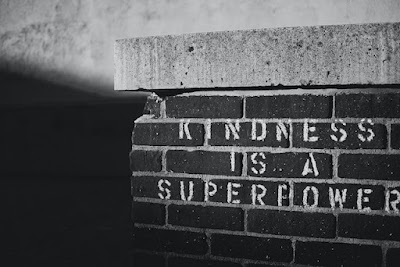Why Is Kindness A Life Saver?
Let’s face it – the world can be a really scary place. With “doom
vultures” circling overhead and naysayers nagging away like a demented earworm.
It easier to become reclusive, locking yourself away from society and worse still
your family and friends. We all need a cure and fortunately there is one super
drug readily available to us – we know it simply as Kindness.
In this article we will take a look at what kindness actually is and why
it’s a choice. We will then discuss the 10 principle benefits of being kind and
why we need to make a conscious effort to affect change in our life. This is
not just for our own individual good but for those people we choose to have
around us.
 |
| Being Kind Is A Superpower We All Should Have |
What Is Kindness?
“I’ve learned that people will forget what you said. People will forget what you did, but, people will never forget how you made them feel.” Maya Angelou
Such a great quote and so true. It reminds us that how we interact with,
and relate to, other people, in our daily lives, is far more important that
what we do.
Kindness is therefore more than a “behaviour”. The art of being kind
means harbouring a spirit of helpfulness, as well as being generous and
considerate, and doing so without expecting anything in return. Kindness is a quality of being. The act of giving kindness often is
simple, free, positive and healthy. Similarly, receiving an act of kindness is
also a boost to our emotional and physical wellbeing.
It really doesn’t matter what you do with your life. You could be a
billionaire business owner or just managing to make ends meet, it’s how you
treat others that is the primary defining feature of being kind.

Love & Compassion Are The Cornerstones Of Kindness
Kindness Is A Choice
Affection, warmth, gentleness, concern, empathy and understanding –
these are all words that are associated with kindness. Consequently, we
sometimes view helpfulness and compassion as being a bit soft but the truth is
quite the reverse. Being kind often requires immense courage and strength. Yes
being kind is a valuable interpersonal skill, but more importantly, kindness
involves choice.
It involves choice because there are so many alternatives to being kind
that will tempt us throughout our lives. These include of course, anger and
apathy. We see it all too often in our modern world. We have allowed divisive
views to come to the fore in society. Are you a Red or are you a Blue etc?
These circumstances may test us. People may question us. The News may
trouble us. Yet, despite these obstacles, every single one of us has the
beautiful ability to actively choose to
be kind. Kindness is caring about others and doing things to help make their
lives better. It allows us to connect with other people and to build meaningful
relationships. For example, when someone acts kindly towards us we feel more
connected and more willing to cooperate with them. When we do something positive
for someone, we cultivate trust, and we feel good about ourselves for being a
kind person.
Why You Should Be Kind
“Carry out a random act of kindness, with no expectation of reward, safe in the knowledge that one day someone might do the same for you.” Princess Diana
Kindness and “niceness” are often considered interchangeable, but
kindness goes deeper. Its layers include generosity, compassion and empathy.
When challenged by an often-cruel world, kindness also takes significant effort
and emotional strength. As mentioned before, being kind is a choice and that
choice can take many forms. Here are 10 reasons as to why being kind is so
important?
1. Being Kind is Associated With Well-Being
For many years researchers have studied kindness and its effects. The
results of these studies consistently show that kindness is linked to better
health and an increased sense of well-being. As recently as 2020, research in
the Psychological Bulletin examined 201 studies of behaviours driven by things
like trust, cooperation, and compassion.
They found a “small but significant” connection to better physical and
mental health. This worked for people giving kindness as well as those people
receiving acts of kindness. It is also interesting to note that there were more
well-being benefits linked to “informal helping” or spontaneous acts of
kindness.
2. Stress Busting
Our bodies have a hormone called “Cortisol” which is also known as the
“stress hormone”. In stressful situations, it’s necessary. It prepares our
bodies for survival in the form of flight or fight and is a very good thing
indeed. However, when the stress levels are increased for a prolonged period of
time the cortisol has a negative effect whereby it stops our bodies from “switching
off”, we have elevated blood pressure, sleep disruption, inability to
concentrate etc. Acts of Kindness are antidotes to this, they help reduce our
levels of cortisol returning our bodies to a more balanced, relaxed state.
3. Boosts Self-Esteem
When people exhibit kindness towards others, there’s a bounce-back
effect – often called “the helper’s high.” Being kind to people floods you with
positive, happy feelings about yourself, increasing your self-esteem. This has
been shown to being an important part of remaining optimistic and productive in
your life. In fact studies show that being kind to strangers has a bigger
effect on self-esteem than kindness towards friends and family.
4. Increases Productivity
Research shows that work environments where kindness is a priority are
more productive! There is a common misconception that “tough love” is needed
for success but too often, “tough love” is just code for a toxic, domineering
environment. One recent study (involving over 3,500 businesses and 50,000 individuals),
showed behaviours like giving praise were linked to better productivity and
lower turnover. If kindness improves a person’s well-being, it makes sense that
it would be beneficial at work.
5. Creates Better Leaders
There is plenty of research out there to show that kindness and empathy
as essential traits for a good leader. These leaders have strong social
connections and a good understanding of peoples’ emotions. They know how
important it is to treat people with dignity and respect. In turn, people trust
and respect them and will remain loyal.
6. Helps Kids Do Better In School
Just like kindness improves a work environment, kindness in school has
positive effects. When the adults in a school encourage traits like empathy and
generosity, it can combat the presence of bullying. This makes our children
feel safer, more confident, and better equipped to form lasting social
connections.
7. A Better Future For Our Children
When children grow up in environments where being kind is common,
they’re more likely to avoid problems like drug use and prison time later in
life. When kids show kindness, they enjoy many benefits, such as reduced
aggression and fewer anti-social behaviours. Research shows that if a child
focuses their kindness mostly on friends, they don’t see as much positive
impact than when they’re more helpful to family and strangers.
8. Healthy And Strong Romantic Relationships
When couples show empathy, compassion, and generosity towards each
other, they are significantly more likely to stay together (and stay happy)
than if kindness isn’t present. Along with emotional stability, kindness is the
most significant predictor of happiness within a marriage.
9. Being Kind To Oneself Is Essential To A Good Life
Kindness towards self (often known as self-compassion) is as important
as compassion towards others. Studies show that people who engage in negative
self-talk and who are overly critical towards themselves are more vulnerable to
depression and anxiety.
10. It’s Contagious
Lastly, being kind is important because it’s contagious. When a person
engages in pro-social behaviours, the people who benefit from them are likely
to turn around and “pay it forward.” This creates a ripple effect where it
becomes more and more common to show kindness.

Being Kind Is A Disease We All Should Have
Taking Notes
Compassion is positivity and sometimes we, understandably, feel a bit
embarrassed to accept praise. But we shouldn’t as mentioned previously being
kind takes courage. You will sometimes need to step out of the shadows of your
own insecurity and embrace the light of kindness.
Given this fact that we have produced a journal to help you on your journey towards a kinder world for yourself and those around you. We have provided the pages for you to record your own acts of kindness. Additionally, you can note when, and how, people have been kind to you. There is even a positivity scale to record how kindness has impacted your day. A Kindness Journal
Conclusion
Sharon Salzberg
Kindness connects us to other beings. As the recipient,
it makes us feel significant and supported. As the giver, it enables us to
contribute positively to something outside of ourselves. In either case, it
confirms our own existence and our relationship with others in a positive way.
Indeed, being kind has the power to save the
world, one person, one life at a time. It can also comfort you in your
darkest moments. By making kindness your superpower, you will have the ability
to bring a positive change to others and to inspire more people to follow suit
in spreading kindness throughout their lives.
————————————–




Comments
Post a Comment